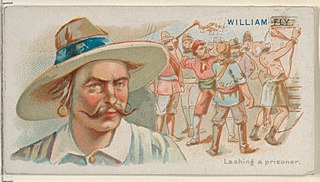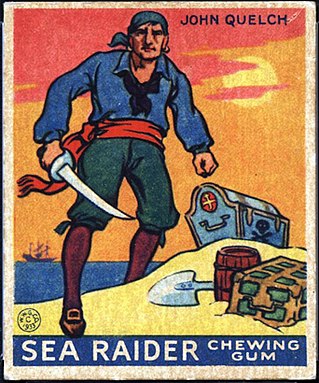Related Research Articles

William Kidd, also known as Captain William Kidd or simply Captain Kidd, was a Scottish privateer. Conflicting accounts exist regarding his early life, but he was likely born in Dundee and later settled in New York City. By 1690, Kidd had become a highly successful privateer, commissioned to protect English interests in North America and the West Indies.

John Rackham, commonly known as Calico Jack, was an English pirate captain operating in the Bahamas and in Cuba during the early 18th century. His nickname was derived from the calico clothing that he wore, while Jack is a nickname for "John".

William Fly was an English pirate who raided New England shipping fleets for three months in 1726 until he was captured by the crew of a seized ship. He was hanged in Boston, Massachusetts, and his body publicly exhibited in a gibbet as a warning to other pirates. His death is considered by many to mark the end of the Golden Age of Piracy.

Benito de Soto Aboal was a Spanish pirate who operated in the Atlantic during the early 19th century. He was the captain of the pirate ship Defensor de Pedro, sometimes incorrectly named as the Burla Negra, that was responsible for several piracies in the Atlantic in 1828, in a period of increased piracy following the independence of the new states of South America.

The Life, Adventures and Piracies of the Famous Captain Singleton is a novel by Daniel Defoe, originally published in 1720. It has been re-published multiple times since, some of which times were in 1840 1927, 1972 and 2008. Captain Singleton is believed to have been partly inspired by the exploits of the late 17th century English pirate Henry Every.
Thomas Green (1679/1680[?]–1705) was an English sailor and alleged pirate, who was captain of the Worcester. He was hanged on Leith sands in Scotland along with two of his crew on 11 April 1705.

The Golden Age of Piracy is a common designation for the period between the 1650s and the 1730s, when maritime piracy was a significant factor in the histories of the North Atlantic and Indian Oceans.

Charles Vane was an English pirate who operated in the Bahamas during the end of the Golden Age of Piracy.
Jeremiah Cocklyn, better known by the name Thomas Cocklyn, was an English pirate known primarily for his association with Howell Davis, Olivier Levasseur, Richard Taylor, and William Moody.
Dirk Chivers was a Dutch pirate active in the Red Sea and Indian Ocean.

Samuel Ross Mason, also spelled Meason, was a Virginia militia captain, on the American western frontier, during the American Revolutionary War. After the war, he became the leader of the Mason Gang, a criminal gang of river pirates and highwaymen on the lower Ohio River and the Mississippi River in the late 18th and early 19th centuries. He was associated with outlaws around Red Banks, Cave-in-Rock, Stack Island, and the Natchez Trace.
See also 1717 in piracy, 1719 in piracy, and Timeline of piracy.
See also 1704 in piracy, other events in 1705, 1706 in piracy, and Timeline of piracy.
See also 1719 in piracy, 1721 in piracy and Timeline of piracy.

John Quelch was an English pirate who had a lucrative but very brief career of about one year. His chief claim to historical significance is that he was the first person to be tried for piracy outside England under Admiralty Law and thus without a jury. These Admiralty courts had been instituted to tackle the rise of piracy in colonial ports where civil and criminal courts had proved ineffective.

An Act to protect the commerce of the United States and punish the crime of piracy is an 1819 United States federal statute against piracy, amended in 1820 to declare participating in the slave trade or robbing a ship to be piracy as well. The last execution for piracy in the United States was of slave trader Nathaniel Gordon in 1862 in New York, under the amended act.

The capture of John "Calico Jack" Rackham was a single-ship action fought between English pirate Calico Jack and British privateer Jonathan Barnet. The battle was fought in the vicinity of Negril, Jamaica and ended with the capture of Rackham and his crew.

The Atlantic World refers to the period between European colonization of the Americas (1492-) and the early nineteenth century. Piracy became prevalent in this era because of the difficulty of policing this vast area, the limited state control over many parts of the coast, and the competition between different European powers. The best known pirates of this era are the Golden Age Pirates who roamed the seas off the coasts of North America, Africa, and the Caribbean.

The Flying Gang was an 18th-century group of pirates who established themselves in Nassau, New Providence in the Bahamas after the destruction of Port Royal in Jamaica. The gang consisted of the most notorious and cunning pirates of the time, and they terrorized and pillaged the Caribbean until the Royal Navy and infighting brought them to justice. They achieved great fame and wealth by raiding salvagers attempting to recover gold from the sunken Spanish treasure fleet. They established their own codes and governed themselves independent from any of the colonial powers of the time. Nassau was deemed the Republic of Pirates as it attracted many former privateers looking for work to its shores. The Governor of Bermuda stated that there were over 1,000 pirates in Nassau at that time and that they outnumbered the mere hundred inhabitants in the town.

Acts of grace, in the context of piracy, were state proclamations offering pardons for acts of piracy. General pardons for piracy were offered on numerous occasions and by multiple states, for instance by the Kingdom of England and its successor, the Kingdom of Great Britain, in the 17th and 18th centuries.
References
- ↑ Hearn, Daniel Allen (13 August 2015). Legal Executions in New England A Comprehensive Reference, 1623-1960. McFarland Incorporated, Publishers. p. 108. ISBN 9781476608532.